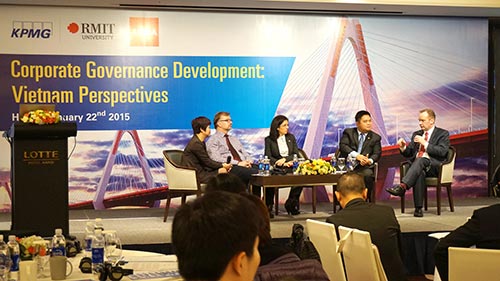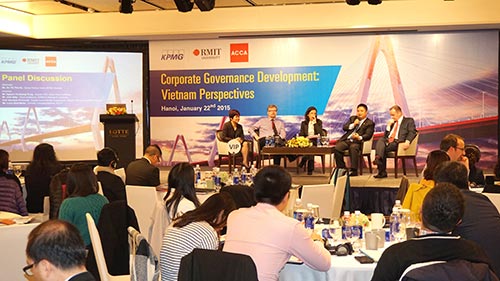Long way to go for Vietnam to improve corporate governance

The study, titled “Balancing Rules & Flexibility”, analyses corporate governance requirements in terms of clarity, degree of enforceability and number and type of instruments used across 25 different markets, which includes both developed and developing markets.
Vietnam ranks above Myanmar, Brunei and Laos but below Cambodia and China and substantially below two other countries in the region namely the Philippines and Thailand. Top of the list are OECD countries such as the US and the UK.

“Vietnam has performed relatively well in some of the key areas of director independence, roles of the board and shareholder rights, there are still areas we could look to improve. These include board diversity, risk governance and assurance,” said KPMG in Vietnam’s head of Advisory John Ditty.

According to Nguyen Vu Quang Trung, Deputy CEO of Hanoi Stock Exchange (HNX), Vietnamese firms have become more and more concerned about corporate governance as they have become aware of how good corporate governance is crucial to operation.
For the past three years, HNX have scored its listed companies in transparency, aiming to encourage listing companies to improve corporate governance initially by disclosing information in a fully and in-time manner.
However, corporate governance quality is not yet reflected in the market price of the firms’ shares nor taken seriously by financial institutions. Trung then suggested Vietnamese supervisory agencies have concrete methods to enforce corporate governance rules at companies as well as annual evaluation of firms and prizes in order to encourage them to improve governance.
What the stars mean:
★ Poor ★ ★ Promising ★★★ Good ★★★★ Very good ★★★★★ Exceptional
Latest News
More News
- KPMG launches tariff modeller in Vietnam to navigate US tariff risks (July 29, 2025 | 12:11)
- Removing hidden barriers to unlock ASEAN trade (June 29, 2025 | 11:31)
- New report charts path for Vietnam’s clinical trial growth (May 21, 2025 | 08:58)
- TTC Agris strengthens market position with investment in Bien Hoa Consumer JSC (May 19, 2025 | 10:14)
- World Bank to help SBV build shared database for banking industry (April 09, 2025 | 08:55)
- New trade alliances and investment hubs are redefining global power dynamics (April 03, 2025 | 17:00)
- ACCA and KPMG forge path for business leaders to pioneer ESG excellence (March 07, 2025 | 10:09)
- VietBank signs MoU with KPMG (February 26, 2025 | 18:47)
- Warrick Cleine MBE: an honour for services to British trade and investment in Vietnam (December 31, 2024 | 20:16)
- KPMG report offers fresh insight into leveraging AI (December 24, 2024 | 09:23)
















 Mobile Version
Mobile Version